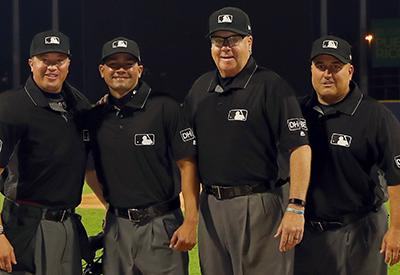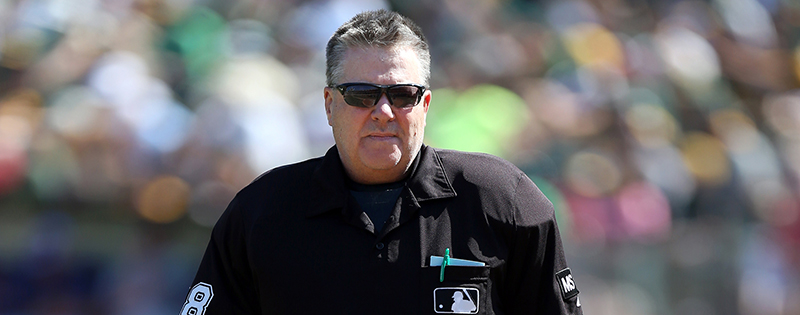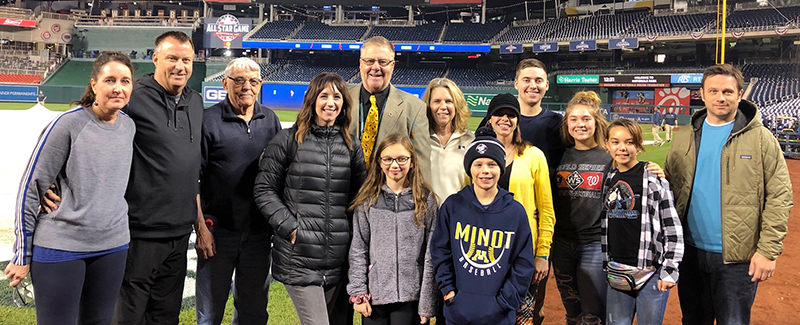
By Michael Linnell
University Communications Director
michael.linnell@minotstateu.edu
Gone fishing.
Gary Cederstrom announced his retirement as an umpire from Major League Baseball in February via Twitter with those two words following a distinguished 31-year career. The Bismarck native worked four World Series, including the crew chief in 2015 and 2019, two All-Star Games, seven League Championship Series, seven Division Series, called a no-hitter, and worked over 3,500 MLB games.
Fast forward to September and Cederstrom ’78 has mostly made good on his tweet.
“Yeah, we got out a few times,” he said. “Probably not as much as I’d like, we are still working on the cabin area and I just got the boat this year, but yeah, my son, son-in-law, grandson, and granddaughters have all been out, heck, even my wife went out once!
“I got a big ol’ bass. My son’s girlfriend caught one that’s a whopper and we are going to get that one mounted. I thought I would put mine on the wall, but then I had the family out and they all caught ones bigger than mine!”
Cederstrom knew he was going to retire after the 2019 season but didn’t necessarily have a plan that included going out on top. But, as fate would have it, his final game in an MLB umpire’s uniform was as crew chief working second base during Game 7 of the World Series between the Washington Nationals and Houston Astros in Houston.
There have been a couple times during the offseason — as he worked on his cabin or sat in a floatable rocking chair allowing him to fish off the dock — when the realization he wouldn’t be traveling to locations like Minute Maid Park sunk in.
“It’s the one thing I guess I’ve thought about a little since retirement, I won’t get to go to cities like Chicago, New York, Boston, the ones in Texas, Toronto,” he said. “You know, you have friends in those cities and you’re not going to see them anymore. Since COVID-19, some of those clubhouse attendants aren’t there anymore. The thing I miss is the people.”

While he enjoyed much of his career on the diamond, Cederstrom admits there were times early on, before breaking through to the highest levels, that doubt would creep in.
“You had to keep an even keel because the grind can affect you,” he said. “So, were there times I thought it wasn’t going to happen? Yep. When I was at A ball in my fourth year, that could have been a sign (to walk away), but a month later, I’m in Double A and then Triple A.”
During those times, however, he fell back on sage, blunt advice he received from various Minot State professors and administrators.
“I got really good advice from guys like Mr. (Gary) Leslie, Dr. (Robert) Holmen, Dr. (Jonathon) Wagner, Mr. (Vence) Elgie; they always had something to say that helped,” he said. “I really enjoyed my conversations with them. “Basically, it was: if you are going to do it, then do it. If you are going to do something, don’t go halfway, all in or all out. If you don’t like what you’re doing, find something else. There’s something out here for you that you love doing, so do that.”
The advice also came in everyday lessons while taking classes towards his physical education degree.
“I had all those guys as instructors, and they pushed you. They taught you, but they pushed you,” Cederstrom said. “They were all from different departments, too. Those were my mentors at Minot State.”
Getting that advice was key for Cederstrom as there wasn’t much patting on the back — as he put it — during his time in the minor leagues. In a profession that is scrutinized on every single call, Cederstrom learned early on, the scrutiny starts well before he stepped on the field.
“People are making judgements on you whether you make a call or not. Presentation, energy, things like that, before you ever even make a call,” he said. “That whole first impression idea and then how can you keep that up. It has to be you, can’t be a façade. You have to bring your lunch pail every day.”
Cederstrom started his professional baseball umpiring career in the Midwest League in 1979, working the long league for four years. In 1982, he worked the Eastern League and moved up to the American Association in 1983. He worked his first MLB game in 1989.

He began the journey in umpire school, looking to break into college baseball.
“I was doing high school and some college but went to umpire school so I could get more college games,” he said. “After that, I didn’t have to do a short league like the Gulf Coast or Pioneer, I went right to a long league, the Midwest League, which you can’t do now.”
After working in the minor leagues, the next goal was to get a Spring Training game. From there, opportunities to get call ups would eventually lead to staying at the major league level.
“It took five years to get an opportunity for Spring Training,” Cederstrom said. “So even then, there were times that you aren’t sure this is ever going to happen. But, I was making good money and I liked the job. Back then, if you were the fourth guy on a callup list, you might get 25 games. Now, the fourth guy is getting 100 games. If you are doing 100 games in the big leagues, you are making pretty good money.”
Over the past 31 years, Cederstrom said the game changed from a more combative game in the 60s and 70s to a more finesse game. He has strong opinions on how the game has transitioned to strikeouts and home runs, but one constant remained.
He was most impressed by those athletes who could fly.
“Yeah, when something phenomenal happens, I go, wow, that was sweet! But, if I had to pick one, we had the game with Bo Jackson and Deion Sanders in Kansas City,” he remembered. “Both could run down the line, but they were way different. Bo runs like a runaway train and Deion is silky smooth. To this day, I enjoy watching people get extra base hits and the most fun are the ones that just glide.
“Doubles and triples and turning hits into extra base hits are fun. I like people running the bases, and you then find out how defensively skilled teams are. You then have some second baseman or shortstop making a phenomenal play and throws someone out at home. That’s big-league ball.”
While Cederstrom lights up during the conversation about Jackson and Sanders, he admits it was time to retire. Spending time with his family during the summer, a luxury he wasn’t afforded with the 162-game MLB schedule in the past, was a big part of the decision. The onset of COVID-19 and the changes that have affected the world, let alone Major League Baseball, have cemented that sentiment.

“I was getting a little long in the tooth,” he said. “It was time. I’m happy I’m retired. I haven’t watched much at this point, but I didn’t go back to my room and turn on a game back then either, that wasn’t my style.”
But that doesn’t mean Cederstrom isn’t busy. He and his son are rebuilding a fishing boat, he coached fastpitch softball this past summer, and is working high school football games, learning how to run again.
“The grass is so much longer for football than baseball. I haven’t fallen yet, I thought I might a couple times, but haven’t yet,” Cederstrom said laughing.
It’s just a different kind of busy.
“I’m always finding something to do, it’s a little different pace,” he said. “I was picking up pinecones at the lake and I looked at my watch and thought, I don’t have any place to be and a long time to get there.”
About Minot State University
Minot State University is a public university dedicated to excellence in education, scholarship, and community engagement achieved through
rigorous academic experiences, active learning environments, commitment to public service, and a vibrant campus life.
Published: 12/03/20




